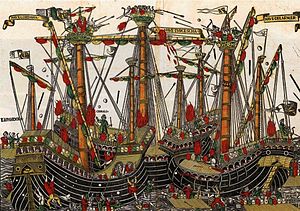Ottoman–Venetian War (1499–1503)
| Second Ottoman–Venetian War | |||||||||
|---|---|---|---|---|---|---|---|---|---|
| Part of the Ottoman–Venetian Wars | |||||||||
 The Battle of Zonchio |
|||||||||
|
|||||||||
| Belligerents | |||||||||
|
|
|
||||||||
| Commanders and leaders | |||||||||
|
|
|
||||||||
The Second Ottoman–Venetian War was fought between the Ottoman Empire and the Republic of Venice for control of the lands that were contested between the two parties in the Aegean Sea, Ionian Sea and the Adriatic Sea. The war lasted from 1499 to 1503.
The Turks, under the command of Admiral Kemal Reis, were victorious and forced the Venetians to recognize their gains in 1503.
In January 1499, Kemal Res set sail from Constantinople with a force of 10 galleys and 4 other types of ships, and in July 1499 met with the huge Ottoman fleet and took over its command in order to wage a large-scale war against the Republic of Venice. The Ottoman fleet consisted of 67 galleys, 20 galliots and about 200 smaller vessels. In August 1499, Kemal Reis defeated the Venetian navy under the command of Antonio Grimani at the Battle of Zonchio (also known as the Battle of Sapienza or the First Battle of Lepanto). It was the first naval battle in history with cannons used on ships, and took place on four separate days: on August 12, 20, 22 and 25, 1499. After reaching the Ionian Sea with the large Ottoman fleet, Kemal Reis encountered the Venetian fleet of 47 galleys, 17 galliots and about 100 smaller vessels under the command of Antonio Grimani near Cape Zonchio and won an important victory. During the battle, Kemal Reis sank the galley of Andrea Loredan, a member of the influential Loredan family of Venice. Antonio Grimani was arrested on 29 September but was eventually released. Grimani later became the Doge of Venice in 1521. The Ottoman Sultan Bayezid II gifted 10 of the captured Venetian galleys to Kemal Reis, who stationed his fleet at the island of Cefalonia between October and December 1499.
...
Wikipedia
